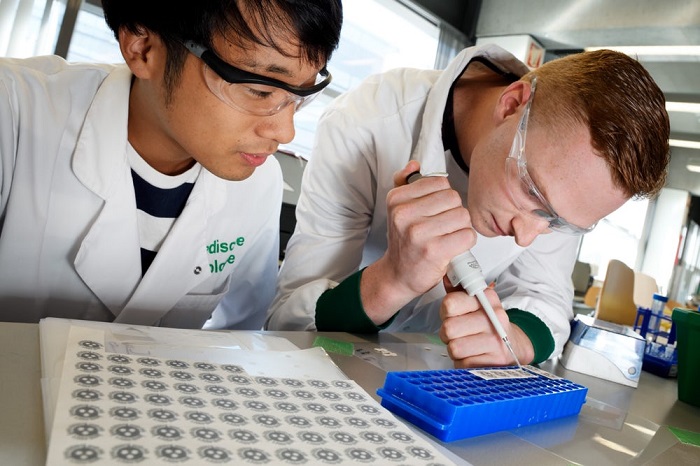Scientists develop low-cost paper blood testing tools to spot light to reveal whether infection
October 10, 2018 Source: cnBeta
Window._bd_share_config={ "common":{ "bdSnsKey":{ },"bdText":"","bdMini":"2","bdMiniList":false,"bdPic":"","bdStyle":" 0","bdSize":"16"},"share":{ }};with(document)0[(getElementsByTagName('head')[0]||body).appendChild(createElement('script')) .src='http://bdimg.share.baidu.com/static/api/js/share.js?v=89860593.js?cdnversion='+~(-new Date()/36e5)];Dutch and Japanese scientists have developed an inexpensive new paper blood test kit that can quickly determine if a patient has an infectious disease. For doctors in developing countries that lack traditional laboratory equipment, this has great clinical benefits. The square carton was created by the University of Technology Eindhoven in the Netherlands and the University of Keio, Japan. Users only need to place a drop of blood in the marked area of ​​the test strip and wait for 20 minutes. Then turn the paper over and check if the color of one of the three light-emitting points on the lower side is abnormal.

Figure: Handmade test prototype
When the blood comes into contact with the test strip, it mixes with the protein contained in the spot, produces a biochemical reaction, and causes the spots to appear blue light. If the blood comes from an uninfected individual, the second step of the reaction will cause the spot to turn green later.
However, if the patient is infected, the antibodies in the blood will bind to the photo-sensitive protein, and to some extent block the second step. As such, at least a portion of the spot will remain blue.
With the companion smartphone app, the clinician can analyze the chromaticity of the spot to determine its position on the blue-green spectrum. Corresponds to the concentration of antibodies in the blood, indicating the severity of the infection.
From a health point of view, this is a question of "greener is better." Researchers can adjust the three spots on the test strip to detect antibodies to specific infectious diseases and even check for three diseases at the same time.
Using this method, researchers have successfully tested HIV, influenza, and dengue in a single blood sample.
Each test strip consists of 2 copies, and three light-emitting points can simultaneously examine three different antibodies.
The study, led by Professor Maarten Merkx of the Technical University of Eindhoven in the Netherlands, was described in a recent paper published in the journal Angewandte Chemie.
If all goes well, the product is expected to be available within a few years.
Luteolin, alias carotenoid, carotenol, phytoalexin, riboflavin, marigoldin and phytoalexin, etc., orange-yellow powder. Natural lutein is an excellent antioxidant. Lutein and zeaxanthin are the only 2 carotenoids in the eye, and the prevention of vision loss and blindness caused by age-related retinal macular degeneration is the unique function of lutein.
Natural lutein is an excellent antioxidant, can resist free radicals in the body caused by cell and organ damage, thus can prevent the body aging caused by cardiovascular sclerosis, coronary heart disease and tumor disease.
Lutein,Lutein Ester,Xanthophyll,Carotenoids
Shaanxi Zhongyi Kangjian Biotechnology Co.,Ltd , https://www.zhongyibiotech.com